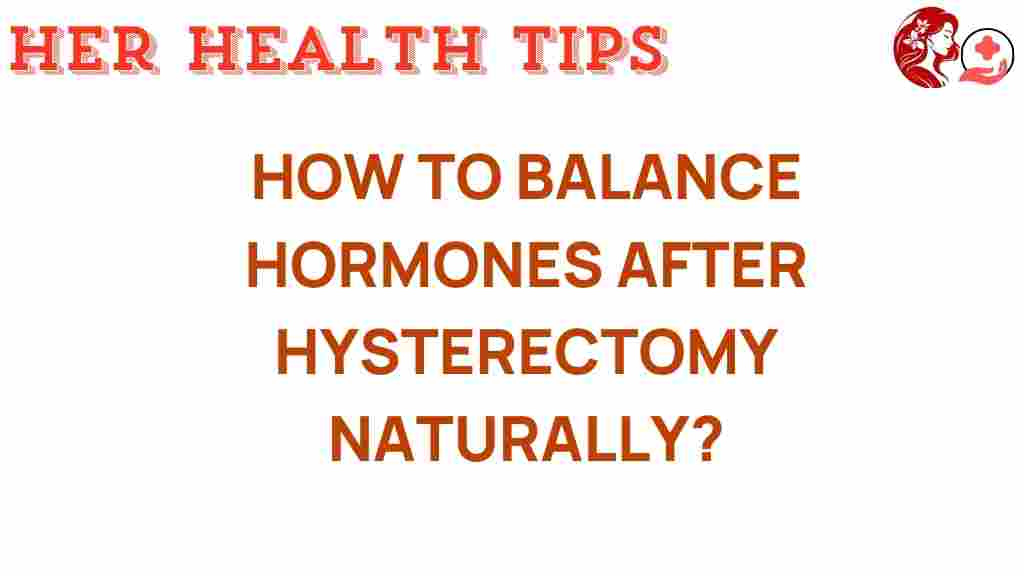Unlocking Harmony: Natural Ways to Balance Hormones Post-Hysterectomy
Experiencing a hysterectomy can be a significant turning point in a woman’s life, impacting not only physical health but also emotional wellbeing. Hormone balance is crucial during this recovery phase, as the body undergoes considerable changes. Many women seek natural remedies to support their body’s healing process and regain equilibrium. In this article, we will explore various holistic approaches, lifestyle changes, nutrition tips, and supplements that can help in achieving hormone balance post-hysterectomy.
Understanding Hormone Balance and Hysterectomy Recovery
After a hysterectomy, whether partial or complete, the body may experience fluctuations in hormone levels, particularly estrogen and progesterone. These fluctuations can lead to uncomfortable symptoms such as mood swings, hot flashes, weight gain, and fatigue. Achieving hormone balance is essential for maintaining overall health and enhancing emotional wellbeing.
Natural remedies offer a holistic approach for women navigating these challenges. Let’s explore effective strategies to support hormone balance in the context of hysterectomy recovery.
Step-by-Step Process to Achieve Hormone Balance
1. Nutrition for Hormone Balance
Nutrition plays a pivotal role in hormone balance. A well-rounded diet can support your body’s natural functions and help mitigate symptoms associated with hormone fluctuations. Here are some key dietary strategies:
- Incorporate Healthy Fats: Foods rich in omega-3 fatty acids, like salmon, walnuts, and flaxseeds, can help reduce inflammation and support hormone production.
- Focus on Fiber: A high-fiber diet can aid in the elimination of excess estrogen. Include whole grains, fruits, and vegetables in your meals.
- Limit Sugar and Processed Foods: Reducing sugar intake can help stabilize blood sugar levels, which is crucial for hormone balance.
- Stay Hydrated: Adequate water intake aids metabolic processes and overall health.
2. Herbal Supplements
Many women find relief through natural supplements. Here are some popular options:
- Black Cohosh: Known for its ability to alleviate hot flashes and support hormonal health.
- Chaste Tree (Vitex): Often used to promote progesterone production and reduce PMS symptoms.
- Red Clover: Contains phytoestrogens that may help balance estrogen levels.
Before starting any supplements, be sure to consult with a healthcare provider to ensure they are appropriate for your individual needs.
3. Lifestyle Changes to Support Hormone Balance
Making certain lifestyle changes can significantly impact hormone balance. Consider the following:
- Regular Exercise: Engaging in physical activity can help manage weight, reduce stress, and improve mood, all of which contribute to hormone balance.
- Stress Management: Techniques such as yoga, meditation, and deep-breathing exercises can help reduce cortisol levels and promote emotional wellbeing.
- Quality Sleep: Aim for 7-9 hours of restful sleep per night. Establishing a bedtime routine can improve sleep quality.
4. Mindfulness and Emotional Wellbeing
Post-hysterectomy recovery can also be an emotional journey. Incorporating mindfulness practices can enhance emotional wellbeing:
- Journaling: Writing down your thoughts and feelings can help process emotions and provide clarity.
- Support Groups: Connecting with other women who have undergone similar experiences can provide comfort and advice.
- Therapy or Counseling: Seeking professional help can be beneficial for managing anxiety or depression.
Troubleshooting Common Issues
Despite your best efforts, you may still encounter challenges in achieving hormone balance. Here are some troubleshooting tips:
1. Persistent Hot Flashes
If you continue to experience hot flashes, consider revisiting your diet. Avoid triggers like caffeine, spicy foods, and alcohol. Staying cool and wearing breathable fabrics can also help.
2. Weight Gain
Weight gain can be a common issue post-hysterectomy. Focus on a balanced diet and regular exercise. Consider consulting a nutritionist for personalized meal plans.
3. Mood Swings
Mood swings can be addressed through stress management techniques and regular physical activity. If mood issues persist, seek professional help for further evaluation.
Nutrition: Key Foods for Hormone Balance
Incorporating specific foods into your diet can enhance hormone balance:
- Cruciferous Vegetables: Broccoli, cauliflower, and Brussels sprouts help the body metabolize estrogen.
- Fermented Foods: Foods like yogurt, kimchi, and sauerkraut support gut health, which is connected to hormone balance.
- Leafy Greens: Spinach and kale are high in essential nutrients that support overall health.
The Importance of Hydration
Staying hydrated is often overlooked but is vital for hormone balance. Water helps in the transportation of hormones and nutrients, supports digestion, and contributes to overall health. Aim to drink plenty of water throughout the day, and consider herbal teas that can also support hormonal health.
Conclusion
Achieving hormone balance post-hysterectomy involves a multifaceted approach that includes nutrition, lifestyle changes, emotional support, and natural remedies. By embracing these holistic approaches, you can enhance your recovery process and improve your quality of life.
Remember, every woman’s journey is unique. It’s essential to listen to your body and consult with healthcare professionals to tailor a plan that suits your individual needs. For more resources on women’s health, consider visiting Women’s Health Network for expert advice and support.
Embrace this new chapter in your life with confidence, knowing that there are natural ways to support your hormone balance and overall wellbeing.
This article is in the category Reproductive and created by HerHealthTips Team
